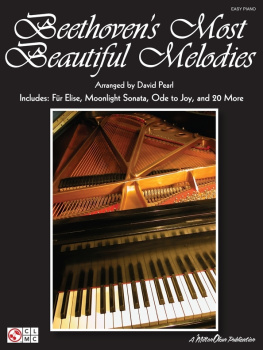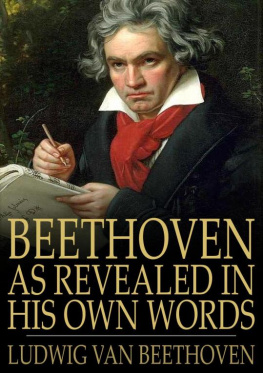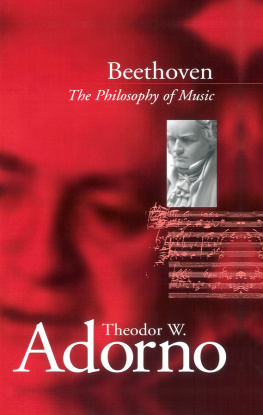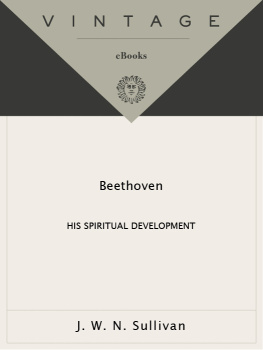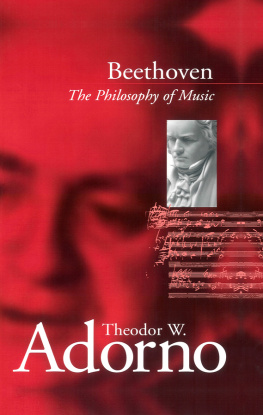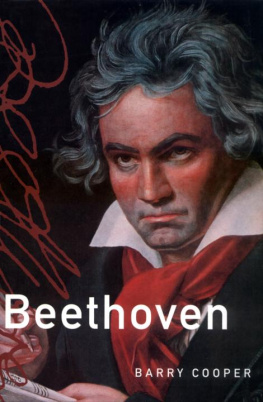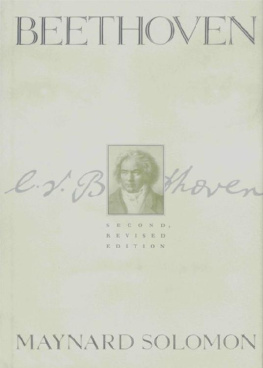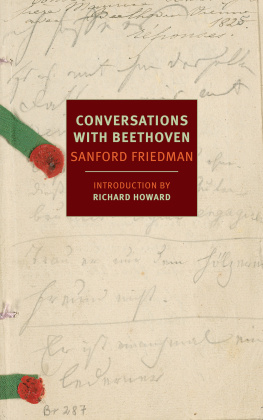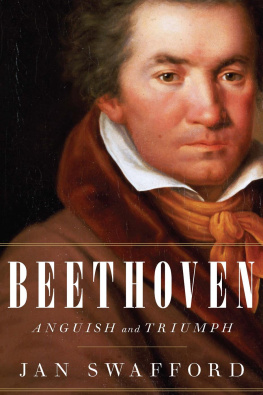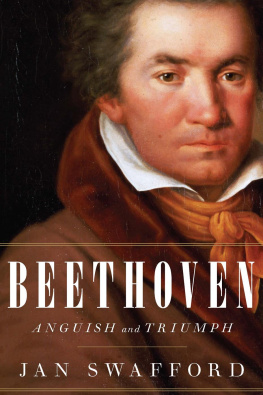Schindler - Copy of Life of Beethoven
Here you can read online Schindler - Copy of Life of Beethoven full text of the book (entire story) in english for free. Download pdf and epub, get meaning, cover and reviews about this ebook. genre: Detective and thriller. Description of the work, (preface) as well as reviews are available. Best literature library LitArk.com created for fans of good reading and offers a wide selection of genres:
Romance novel
Science fiction
Adventure
Detective
Science
History
Home and family
Prose
Art
Politics
Computer
Non-fiction
Religion
Business
Children
Humor
Choose a favorite category and find really read worthwhile books. Enjoy immersion in the world of imagination, feel the emotions of the characters or learn something new for yourself, make an fascinating discovery.
- Book:Copy of Life of Beethoven
- Author:
- Genre:
- Rating:3 / 5
- Favourites:Add to favourites
- Your mark:
- 60
- 1
- 2
- 3
- 4
- 5
Copy of Life of Beethoven: summary, description and annotation
We offer to read an annotation, description, summary or preface (depends on what the author of the book "Copy of Life of Beethoven" wrote himself). If you haven't found the necessary information about the book — write in the comments, we will try to find it.
Copy of Life of Beethoven — read online for free the complete book (whole text) full work
Below is the text of the book, divided by pages. System saving the place of the last page read, allows you to conveniently read the book "Copy of Life of Beethoven" online for free, without having to search again every time where you left off. Put a bookmark, and you can go to the page where you finished reading at any time.
Font size:
Interval:
Bookmark:
The Project Gutenberg EBook of Life of Beethoven, by Anton Schindler This eBook is for the use of anyone anywhere at no cost and with almost no restrictions whatsoever. You may copy it, give it away or re-use it under the terms of the Project Gutenberg License included with this eBook or online at www.gutenberg.org/license
Title: Life of Beethoven
Author: Anton Schindler
Editor: Ignace Moscheles
Release Date: March 10, 2012 [EBook #39093]
Language: English
Character set encoding: ISO-8859-1
*** START OF THIS PROJECT GUTENBERG EBOOK LIFE OF BEETHOVEN ***
Produced by Chuck Greif and the Online Distributed Proofreading Team at http://www.pgdp.net (This file was produced from images generously made available by The Internet Archive)
[The original punctuation and spelling of the original have been retained in this etext. Variations in spellings of place-names, personal names and hyphenization have not been normalized. (note of etext transcriber)]
[Illustration: image of the book's cover]
[Illustration: Ludwig van Beethoven]
THE LIFE OF BEETHOVEN,
INCLUDING HIS
CORRESPONDENCE WITH HIS FRIENDS,
NUMEROUS CHARACTERISTIC TRAITS,
AND REMARKS ON HIS MUSICAL WORKS.
EDITED BY
IGNACE MOSCHELES, ESQ.,
Pianist to his Royal Highness Prince Albert.
IN TWO VOLUMES.
VOLUME I.
LONDON: HENRY COLBURN, PUBLISHER, 13, GREAT MARLBOROUGH STREET.
1841.
LONDON: Printed by WILLIAM CLOWES and SONS, Stamford Street.
THE EDITOR'S PREFACE.
Although on appearing for the first time as the Editor of a literary publication, my feelings may be somewhat like those of a child putting on a new dress, yet I feel the responsibility of my position far more than its novelty; for the subject of my first essay is one not to be approached by me, at least, without seriousness and reverence. That the amount, however, of this editorial responsibility may be thought neither greater nor less than it really is, I must beg leave to state my precise share in this publication, and to advert to the qualifications with which I have entered on my task.
In acceding to Mr. Colburn's request that I would add to the English translation of Schindler's Biography of Beethoven which he was about to publish, such explanatory notes, characteristics, and letters as might tend more fully to illustrate and complete the whole, I had to subscribe to one clause in the agreement between Mr. Schindler and the publisher, namely, that the work should be given as he wrote it, without omission or alteration. The Notes bearing my signature, then, are all that belong to me in these volumes. The Appendix is, however, of my collection, and will be found to consist of the following documents:-
VOLUME I.
Letters from Beethoven to Kapellmeister Hoffmeister and C. F. Peters, music-publishers, relative to the sale of some of his compositions.
Letter on the first appearance of Beethoven's "Fidelio."
Beethoven's Letters to Madame Bettine Von Arnim.
Letter of Madame Bettine Von Arnim to Gthe.
A Day with Beethoven.
VOLUME II.
Beethoven's Letters to Mademoiselle Von Breuning, Wegeler, and Ries.
Beethoven's Correspondence with Messrs. Neate and Ries.
Account of a Concert given by Beethoven at the Kaernthnerthor Theatre, Vienna.
Characteristics of Beethoven from Wegeler and Ries's "Notizen."
Additional Characteristics, Traits, and Anecdotes of Beethoven.
Beethoven's Last Moments.
Funeral Honours to Beethoven, and Miserere. Amplius. Libera, for four voices, with an Organ accompaniment, performed at the funeral.
Concert in aid of Beethoven's Monument, at Drury Lane Theatre, July 19th, 1837.
Sale of Beethoven's MSS. and Musical Library.
Systematic Catalogue of all the original Works of Beethoven, published by T. Haslinger, from Vienna.
Moscheles' complete Edition of Beethoven's Works, published by Messrs. Cramer and Co.
So far the task of explanation is easy; but I am now entering upon more delicate ground--my own qualifications for the editorship. If in stating these I appear to be somewhat prolix, I hope that a little indulgence may be conceded to me from my desire to show that my impressions of reverence for Beethoven's genius are not things of yesterday; but that I began early to follow him in his glorious creations, and to study his personal, as well as his artistical character, with an enthusiasm which years and experience have done nothing to diminish. To satisfy the craving which I felt, when a boy nine or ten years old, at Prague, for the best musical productions of the time, I subscribed to a library which afforded me the compositions of Dussek, Steibelt, Woelffl, Kozeluch, and Eberl--works of no insurmountable difficulty to me; though, indeed, so far from mastering them, I only ran through them, without particular attention to finish, enjoying in each its peculiar style. I had been placed under the guidance and tuition of Dionysius Weber, the founder and present director of the Prague Musical Conservatory; and he, fearing that, in my eagerness to read new music, I might injure the systematic development of my Piano-forte playing, prohibited the library; and, in a plan for my musical education which he laid before my parents, made it an express condition, that for three years I should study no other authors but Mozart, Clementi, and S. Bach. I must confess, however, that, in spite of such prohibitions, I visited the library, gaining access to it through my pocket-money. It was about this time that I learnt from some school-fellows that a young composer had appeared at Vienna, who wrote the oddest stuff possible--such as no one could either play or understand; crazy music, in opposition to all rule; and that this composer's name was Beethoven. On repairing to the library to satisfy my curiosity as to this so-called eccentric genius, I found there Beethoven's Sonate pathtique. This was in the year 1804. My pocket-money would not suffice for the purchase of it, so I secretly copied it. The novelty of its style was so attractive to me, and I became so enthusiastic in my admiration of it, that I forgot myself so far as to mention my new acquisition to my master, who reminded me of his injunction, and warned me not to play or study any eccentric productions until I had based my style upon more solid models. Without, however, minding his injunctions, I seized upon the piano-forte works of Beethoven as they successively appeared, and in them found a solace and a delight such as no other composer afforded me.
In the year 1809, my studies with my master, Weber, closed; and, being then also fatherless, I chose Vienna for my residence to work out my future musical career. Above all, I longed to see and become acquainted with that man who had exercised so powerful an influence over my whole being; whom, though I scarcely understood, I blindly worshipped. I learnt that Beethoven was most difficult of access, and would admit no pupil but Ries; and, for a long time, my anxiety to see him remained ungratified. In the year 1810, however, the longed-for opportunity presented itself. I happened to be one morning in the music-shop of Domenico Artaria, who had just been publishing some of my early attempts at composition, when a man entered with short and hasty steps, and, gliding through the circle of ladies and professors assembled on business or talking over musical matters, without looking up, as though he wished to pass unnoticed, made his way direct for Artaria's private office at the bottom of the shop. Presently Artaria called me in, and said, "This is Beethoven!" and, to the composer, "This is the youth of whom I have just been speaking to you." Beethoven gave me a friendly nod, and said he had just heard a favourable account of me. To some modest and humble expressions which I stammered forth he made no reply, and seemed to wish to break off the conversation. I stole away with a greater longing for that which I had sought than I had felt before this meeting, thinking to myself--"Am I then indeed such a nobody that he could not put one musical question to me?--nor express one wish to know who had been my master, or whether I had any acquaintance with his works?" My only satisfactory mode of explaining the matter and comforting myself for this omission was in Beethoven's tendency to deafness, for I had seen Artaria speaking close to his ear.
Font size:
Interval:
Bookmark:
Similar books «Copy of Life of Beethoven»
Look at similar books to Copy of Life of Beethoven. We have selected literature similar in name and meaning in the hope of providing readers with more options to find new, interesting, not yet read works.
Discussion, reviews of the book Copy of Life of Beethoven and just readers' own opinions. Leave your comments, write what you think about the work, its meaning or the main characters. Specify what exactly you liked and what you didn't like, and why you think so.





